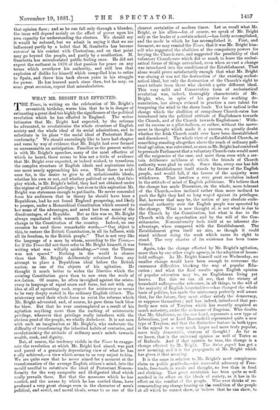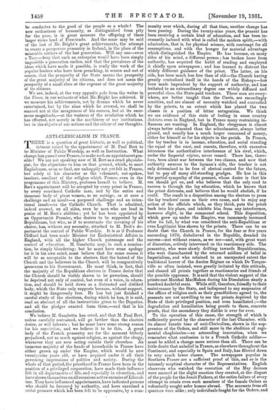WHAT MR. BRIGHT HAS EFFECTED.
THE Times, in writing on the celebration of Mr. Bright's seventieth birthday, warns him that he is in danger of estimating a great deal too highly the significance of the political revolution which he has effected in England. The writer intimates that Mr. Bright had expected, by the reforms he advocated, to revolutionise the whole structure of English society and the whole ideal of its social admirations, and to substitute in its place "the social ideal of Protestant Non- conformity." We should exceedingly like to have had chapter and verse by way of evidence that Mr. Bright had ever formed so unreasonable an anticipation. Familiar as the present writer is with Mr. Bright's speeches, many of the most effective of which he heard, there seems to him not a tittle of evidence that Mr. Bright ever expected, or indeed wished, to transform the complex structure of English ideals and aspirations into one more nearly approaching his own. What there is evid- ence for, is the desire to give to all unfashionable ideals, whether his own or not, and whether political or not, that fair- play which, in Mr. Bright's belief, they had not obtained under the regime of political privilege ; but even to this aspiration Mr. Bright was statesman enough to put limits. He never concealed from his audiences that in theory he should have been a Republican, had he not found England prospering, and likely to prosper, under a Monarchical Constitution which secured to her some of the advantages, and saved her from some of the
disadvantages, of a Republic. But as this was so, Mr. Bright
always repudiated with warmth the notion of desiring any change in the Constitution of the country. Indeed, on one occasion he used these remarkable words,—" Our object is this, to restore the British Constitution, in all its fullness, with all its freedom, to the British people." That is not very like the language of a man by whom, according to the Times,— for if the Times did not there refer to Mr. Bright himself, it was writing what was wilfully misleading,—" even the Throne was not spared." Nothing in the world is clearer than that Mr. Bright deliberately refrained from any attempt to place a Republican ideal before the British nation, as one of the objects of his agitation. He thought it much better to widen the liberties which the existing Constitution gave than to sow even the seeds of revolution. Of course, he often inveighed against the aristo- cracy in language of equal scorn and force, but not with any idea at all of uprooting such respect for aristocracy as seems to be very deeply rooted in the ordinary English citizen. The aristocracy used their whole force to resist the reforms which Mr. Bright advocated, and, of course, he gave them back blow for blow. But that he ever contemplated as a result of his agitation anything more than the curbing of aristocratic privilege, wherever that privilege really interferes with the obvious good of the people, we wholly disbelieve. It is not men with such an imagination as Mr. Bright's, who underrate the difficulty of transforming the inherited habits of centuries, and revolutionising the attitude of ordinary men's minds towards wealth, rank, and dignity.
But, of course, the tendency visible in the Times to exagge- rate the revolution at which Mr. Bright had aimed. was part and parcel of a genuinely depreciating view of what he has really achieved,—a view which seems to us very unjust to him.
We are quite sure that he never aimed for a moment at the transformation of the average English citizen's mind, into the mould needful to substitute the ideal of Protestant Noncon- formity for the very composite and ill-digested ideal which really prevails there. But that the measures which he has carried, and the means by which he has carried them, have produced a very great change even in the character of men's political, and social, and moral ideals, seems to us one of the
clearest certainties of modern times. Let us recall what Mr. Bright, or his allies—for, of course, we speak of Mr. Bright only as the leader of a certain school,—has fairly accomplished, and the mode in which he has accomplished it. First, and foremost, we may remind the Times, that it was Mr. Bright him- self who suggested the abolition of the compulsory powers for levying the Church-rate, and suggested the possibility of that voluntary Church-rate which did so much to leave the ecclesi- astical forms of things untouched, even when so vast a change was introduced into the conditions of the Establishment. That alone would prove satisfactorily enough that what Mr. Bright was aiming at was not the destruction of the existing ecclesi- astical ideal, but only the destruction of the Church's right to exact tribute from those who cherish a quite different ideal. This very mild and Conservative form of ecclesiastical revolution was, indeed, thoroughly characteristic of Mr. Bright, who, in spite of his genius for scathing de- nunciation, has always evinced in practice a rare talent for tempering the wind to the shorn lamb. Yet how radical is the change which the abolition of compulsory Church-rates has introduced into the political attitude of Englishmen towards the Church, and of the Church towards Englishmen 1 With- out its success as a pilot-balloon, or rather, without the move- ment in thought which made it a success, we greatly doubt whether the Irish Church could ever have been disestablished and disendowed. The whole view of an Established Church, as something standing altogether above the reach of ordinary poli- tical agitation, was subverted, so soon as Mr. Bright had contrived to persuade Parliament that a voluntary Church-rate would meet all the exigencies of the case, and meet them even with a cer- tain deliberate mildness at which the friends of Church authority were glad to catch. Since then, every one has felt that the Establishment itself stands by favour of the English people, and would fall, if the favour of the majority were withdrawn. That involves a very great revolution indeed in the attitude of mind of English politicians. We believe that the change has made Dissenters, on the whole, more tolerant of the Church,—less inclined rather than more inclined to push the fight they had so long waged against its privileges. But, however that may be, the notion of any absolute eccle- siastical authority over the English people was uprooted by the change. What is now thought of, is not what is due to the Church by the Constitution, but what is due to the Church with the approbation and by the will of the Con- stituencies. Nonconformity feels itself at no inherent dis- advantage, when compared with the Establishment. The Establishment gives itself no airs, as though it could stand without doing the work which earns its right to stand. The very charter of its existence has been trans- formed.
Again, take the change effected by Mr. Bright's agitation, more than by any other single agency, in the adoption of house- hold suffrage. As Mr. Bright himself said on Wednesday, no smaller change would have been enough to overcome the enormous difficulties blocking the way of popular Edu- cation ; and what the final results upon English opinion of popular education may be, no Englishman living yet knows. But this we can all see, that the victory of household suffrage—the reference, in all things, to the will of the majority of English householders—has changed the whole basis of politics, has made the aristocracy perfectly well aware that, for the future, they must either satisfy the democracy, or suppress themselves ; and has, indeed, introduced that per- fectly new vein of Toryism which has recently acquired so much notoriety, under the nickname of Jingoism. Who doubts that Mr. Gladstone, on the one hand, represents a new type of Liberalism, just as Lord Beaconsfield represented quite a new type of Toryism, and that the distinctive feature in both types is the appeal to a very much larger and more truly popular, more truly democratic, stratum of thought ? As far as we know, that is the universal opinion as well of Tories as of Radicals. And if that opinion be true, the change is a
change effected by Mr. Bright. The Sales populi has got a new meaning, and it is the propaganda of Mr. Bright which has given it that meaning.
It is the same in relation to Mr. Bright's most conspicuous claim on public gratitude,—his successful advocacy of Free- trade, free-trade in words and thought, no less than in food and clothing. That great revolution has been quite as well marked in its effect on the ideals of society, as it has in its effect on the comfort of the people. Who ever thinks of re- commending any change bearing on the condition of the people at all which he cannot show, or believe that he can show, to be conducive to the good of the people as a whole ? The new enthusiasm of humanity, as distinguished from pity for the poor, is in great measure the offspring of these larger views bred of Free-trade. And the same may be said of the last of Mr. Bright's great achievements, the attempt to create a prosperous peasantry in Ireland, in the place of the miserable cottiers of the last generation. Will any one—even a Tory—deny that such an enterprise would have been simply impossible a generation earlier, and that the prevalence of the ideas which have made it possible, is really the work of the popular leaders who have been preaching, in season and out of season, that the prosperity of the State means the prosperity of the great majority of its citizens, and does not mean the prosperity of a small class at the expense of the great majority of its citizens.
We are, indeed, at the very opposite pole from the writer in the Times, in our estimate of what Mr. Bright has achieved. If we measure his achievements, not by dreams which he never entertained, but by the aims which he avowed, we shall be amazed not at the meagreness of his success, but at its enor- mous magnitude,—at the vastness of the revolution which he has effected, not merely in the machinery of our institutions, but in the objects of our actions and the colour of our thoughts.







































 Previous page
Previous page